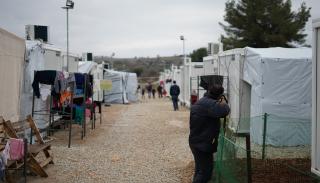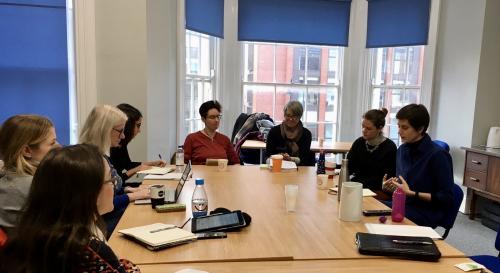
Breadcrumbs navigation
Polycentric governance of transit migration: A relational perspective from the Balkans and the Middle East
Maria Koinova discusses her Review of International Studies (RIS) article with BISA Director, Juliet Dryden. The article was published in the July 2022 issue of RIS.
State and non-state actors interact in both formal and informal ways during migration governance. Yet, we know little about such interactions, especially in the field of transit migration, a largely regional phenomenon. Building on relational theories in International Relations, this article introduces a novel relational approach to polycentric governance. It argues that at the centre of such governance are not simply institutions or migration regimes, but power-laden relations among governmental, non-governmental, supranational, and non-state actors, as well as sending and destination states.
You can read the full article at: https://doi.org/10.1017/S0260210521000693
This article is open access, however BISA members receive access to RIS (and our other journal European Journal of International Security) as a benefit of membership. To gain access to these journals, and read more articles like this, log in to your BISA account and scroll down to the 'Membership benefits' section. If you're not yet a member join today.
Full article abstract
State and non-state actors interact in both formal and informal ways during migration governance. Yet, we know little about such interactions, especially in the field of transit migration, a largely regional phenomenon. Here the categories of migrants are fluid between refugees, regular and irregular migrants, including those from conflict regions. Governance takes place also informally. Building on relational theories in International Relations, this article introduces a novel relational approach to polycentric governance. I argue that at the centre of such governance are not simply institutions or migration regimes, but power-laden relations among governmental, non-governmental, supranational, and non-state actors, as well as sending and destination states. These form architectures of partially official, partially informal dynamics that govern transit migration in a particular world region. Such architectures are based on mechanisms of cooperation, conditionality, containment, contestation, and others, combined in regionally specific ways. The mechanisms manifest themselves differently depending on how actors are embedded in places with different political regimes and statehood capacities. The article illustrates this relational perspective to polycentric governance with comparative evidence from the Balkans and the Middle East.
Photo by Julie Ricard on Unsplash


